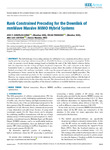Rank Constrained Precoding for the Downlink of mmWave Massive MIMO Hybrid Systems

Ver/Abrir
Use este enlace para citar
http://hdl.handle.net/2183/27749
Excepto si se señala otra cosa, la licencia del ítem se describe como Atribución 4.0 Internacional (CC BY 4.0)
Colecciones
- Investigación (FIC) [1678]
Metadatos
Mostrar el registro completo del ítemTítulo
Rank Constrained Precoding for the Downlink of mmWave Massive MIMO Hybrid SystemsFecha
2021-02-11Cita bibliográfica
J. P. González-Coma, Ó. Fresnedo and L. Castedo, "Rank Constrained Precoding for the Downlink of mmWave Massive MIMO Hybrid Systems," in IEEE Access, vol. 9, pp. 28459-28470, 2021, doi: 10.1109/ACCESS.2021.3058844.
Resumen
[Abstract]
The hybrid design of precoding schemes for millimeter-wave communications allows exploiting the gains by using large antenna array with an affordable hardware cost and power consumption. In this work, we present a novel design strategy based on limiting the rank of the fully digital solutions before their decomposition into the analog and digital baseband components. This rank constraint on the digital formulation leads to a joint precoding and scheduling scheme where the number of allocated streams is limited according to the hardware constraints. In this way, the proposed approach can significantly reduce the performance losses caused by the direct decomposition of the unconstrained digital precoders. The resulting rank-constrained problems for the considered scenario are not convex and difficult to sort out. However, we propose several algorithms to compute the rank-constrained digital solutions with the help of the uplink-downlink duality for the achievable sum-rate. The obtained results show that this strategy achieves considerably higher sum-rates regardless of the channel conditions or available hardware resources.
Palabras clave
Radio frequency
Precoding
Hardware
Baseband
Downlink
Massive MIMO
Antenna arrays
Precoding
Hardware
Baseband
Downlink
Massive MIMO
Antenna arrays
Versión del editor
Derechos
Atribución 4.0 Internacional (CC BY 4.0)
ISSN
2169-3536






